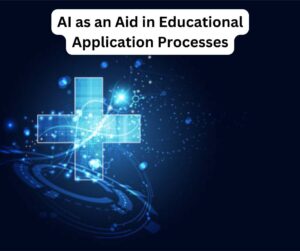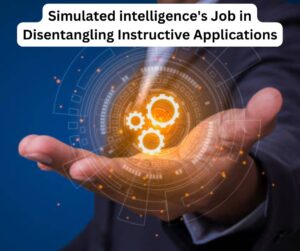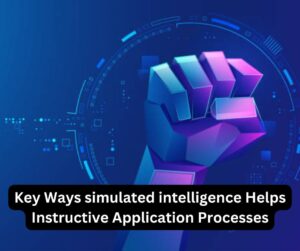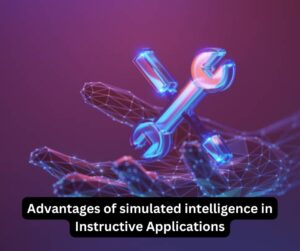
AI as an Aid in Educational Application Processes
Computerized reasoning (man-made intelligence) is changing ventures around the world, and training is no special case.
One of the most significant regions where computer based intelligence is causing disturbances is in instructive application processes.
From smoothing out admissions to offering customized direction, computer based intelligence is reshaping how understudies, organizations, and teachers explore the complicated universe of instruction.
Simulated intelligence’s Job in Disentangling Instructive Applications

Applying to schools, universities, or colleges is in many cases an overwhelming undertaking.
With different structures, changing cutoff times, and broad necessities, the cycle can overpower even the most pre-arranged understudies.
Simulated intelligence carries request to this turmoil via robotizing dreary assignments, improving direction, and offering customized help.
Key Ways simulated intelligence Helps Instructive Application Processes

1. Streamlined Affirmations Management
Man-made intelligence controlled frameworks can robotize the assessment of utilization materials, for example, test scores, records, and suggestion letters.
These instruments examine enormous volumes of information rapidly, distinguishing designs and coordinating candidates with foundations that best suit their profiles.
This diminishes the managerial weight on confirmations staff and guarantees fair, information driven assessments.
2. Personalized Application Assistance
Virtual man-made intelligence aides guide understudies through the application cycle bit by bit.
These aides answer questions, recommend programs in view of interests and capabilities, and guarantee that understudies don’t miss cutoff times.
For instance, chatbots like AdmitAI or Unibuddy offer ongoing help, assisting understudies with exploring convoluted application prerequisites.
3. Predictive Investigation for Better Matches
Man-made intelligence can dissect an understudy’s scholarly exhibition, extracurricular exercises, and inclinations to suggest organizations where they are probably going to flourish.
Prescient examination likewise assist organizations with distinguishing up-and-comers who line up with their main goal and values, making a commonly useful match.
4. Tailored Paper Feedback
Composing convincing individual proclamations or expositions is a vital piece of numerous application processes.
Man-made intelligence fueled apparatuses like Grammarly or EssayJack give moment criticism on language structure, tone, and content significance, empowering understudies to refine their articles and present the best version of themselves.
5. Automated Archive Verification
Computer based intelligence guarantees that application records are bona fide and mistake free.
By examining and cross-referring to data, artificial intelligence apparatuses identify irregularities or fake sections, keeping up with the trustworthiness of the affirmations interaction.
Advantages of simulated intelligence in Instructive Applications

1. Efficiency
Via robotizing tedious assignments, computer based intelligence saves time for the two candidates and affirmations officials.
This permits establishments to zero in on building connections and giving a superior candidate experience.
2. Fairness
Man-made intelligence lessens human predisposition in navigation, guaranteeing an additional impartial confirmations process.
Calculations assess applicants in view of predefined measures, limiting abstract decisions.
3. Cost Savings
For instructive foundations, computer based intelligence lessens the expense of manual handling and staff hours.
Understudies, as well, benefit monetarily by getting exact direction that forestalls squandered application charges.
4. Enhanced Accessibility
Man-made intelligence guarantees that the application cycle is comprehensive and easy to use, no matter what an understudy’s experience or area.
True Instances of computer based intelligence in Action

1. Common Application with computer based intelligence Integration
The Normal Application stage utilizes computer based intelligence to furnish understudies with customized proposals, making it more straightforward to recognize appropriate schools.
2. Google’s computer based intelligence in Education
Google utilizes computer based intelligence to help worldwide understudies with language interpretation and social transformation, working on their application process.
3. Scholarship Matching by AI
Stages like Scholly use man-made intelligence to coordinate understudies with grants custom fitted to their profiles, reducing the monetary weight of training.
Challenges and Moral Considerations
While computer based intelligence offers various advantages, it additionally presents difficulties:
– Predisposition in Algorithms:
While possibly not painstakingly planned, computer based intelligence calculations can sustain predispositions present in verifiable information.
Establishments should guarantee that their man-made intelligence frameworks are straightforward and fair.
– Information Protection Concerns:
Taking care of delicate individual information requires hearty safety efforts to forestall breaks and abuse.
– Over-Dependence on Technology:
While artificial intelligence can help, it shouldn’t trade the human touch fundamental for nuanced dynamic in training.

“Well explained, made the topic much easier to understand!”
Военные используют тепловизоры для
обнаружения целей в условиях плохой видимости и скрытности.
My web page … тепловизор для охоты